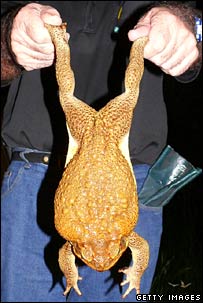 The Problem: The Cane Toad (Bufo Marinus) is Australia’s greatest ever threat to native fauna since man arrived.
The Problem: The Cane Toad (Bufo Marinus) is Australia’s greatest ever threat to native fauna since man arrived.The History: Introduced as a pest control in the sugar cane fields in the 1930’s it spread quickly and finding no predators, has now reached approx 200 million spread over Northern Australia, and because the are
- Very poisonous (they have a toxic skin), and kill predators that eat or bite them, and
- Voracious predators and will eat anything that they can get their mouths round e.g. Small mammals, insects, fish, Chihuahuas etc etc.
- The breed like hell, and with no predators the young survive in massive numbers.
 Recent projections (which currently exclude Global Warming effects) show that their range could double in the next few decades, and so far there has been no successful method devised to counteract this spread.
Recent projections (which currently exclude Global Warming effects) show that their range could double in the next few decades, and so far there has been no successful method devised to counteract this spread.Nature fights back:
There is some evidence that some species are showing increased toleration of the toxin in small amounts and that natural selection is favouring predators that can’t attack the larger Toads. E.g. Smaller mouth sizes on snakes. They can survive biting smaller Cane Toads.
However this is very slow, not proven and reversing millennium of adaptation to normal conditions so may still result in the wipe out of the native species.
Possible Controls:
Poisoning: Obviously this would also kill native species of amphibian and other creatures – would only be possible if the Cane Toad has wiped out all native life anyway. This is the drastic solution.
Introducing a Predator: As this is how the problem originally started it’s not likely to be adopted, especially as there are no suitable candidates around.
Genetic Engineering: This takes two possible forms:
- Genetically altering predator species to withstand the poisonous toxins of the Cane Toads skins – Dr Thomas Madsen believes he has found the gene that confers resistance to toad toxin, and is advocating the idea of creating toad resistant Quolls, Goannas (Small rodents and Lizards etc).
- Genetically altering the Cane Toads to only produce “male” toads. The hope being that over a few years they would breed themselves out of existence. Professor Peter Koopman, from The University of Queensland’s Institute for Molecular Bioscience, is developing a strain of “daughter less” cane toads - toads that can give birth only to sons.“We hope to transplant a ‘gene’ into toads that will cause any female tadpoles they produce to change course and become males,” he said. “All of the offspring of this genetically engineered toad would thus be male, and they would all be carrying the daughter less gene. "It’s probably the greenest and safest solution to manage the cane toad problem – it doesn’t involve any toxins or pathogens, so the toads cannot develop immunity against it, and there is no risk to native frog species that we want to protect.”
These objections could maybe be tackled by;
- Taking as wide a range of subjects for manipulation as possible from the wild population (reintroduced into the areas they were taken from), to ensure that the successful pools were still as diverse as before, but shared that one altered gene, along with the hundreds that they must already share in common (or they wouldn't be 'Quolls' in the first place if you follow my drift).
- A limited introduction from external wild sources (after the toads have gone). They may not be entirely similar to the native versions but better than nothing and would introduce diversity.
- A controlled release of some captive stock (I am aware that these stocks have often been manipulated by breeders, so this really would have to be controlled e.g. aggressive males are a good wild breeding trait, but have been bred out of captive stocks etc). However there are reserve wild stocks being set up that could assist in this.
Cane Toads eating habits.

G'Day
ReplyDeleteThese suckers are everywhere, especially during the mating season. Running them over in a truck brings down the numbers!
This isn't a reply to a post comment that I am sure isn't from a real Australian 'G'Day' indeed!!
DeleteIts an Update:
There is a promising development that may help tackle a number of invader species: Gene-Editing via CRISPR technology has allowed scientists "Gene drives".
The DNA introduced into the invader species often makes one sex infertile and with the added safety switch off gene that can be added its been suggested as a solution to Cane Toads, in Australia, Grey Squirrels in the UK, and even Mosquitoes.